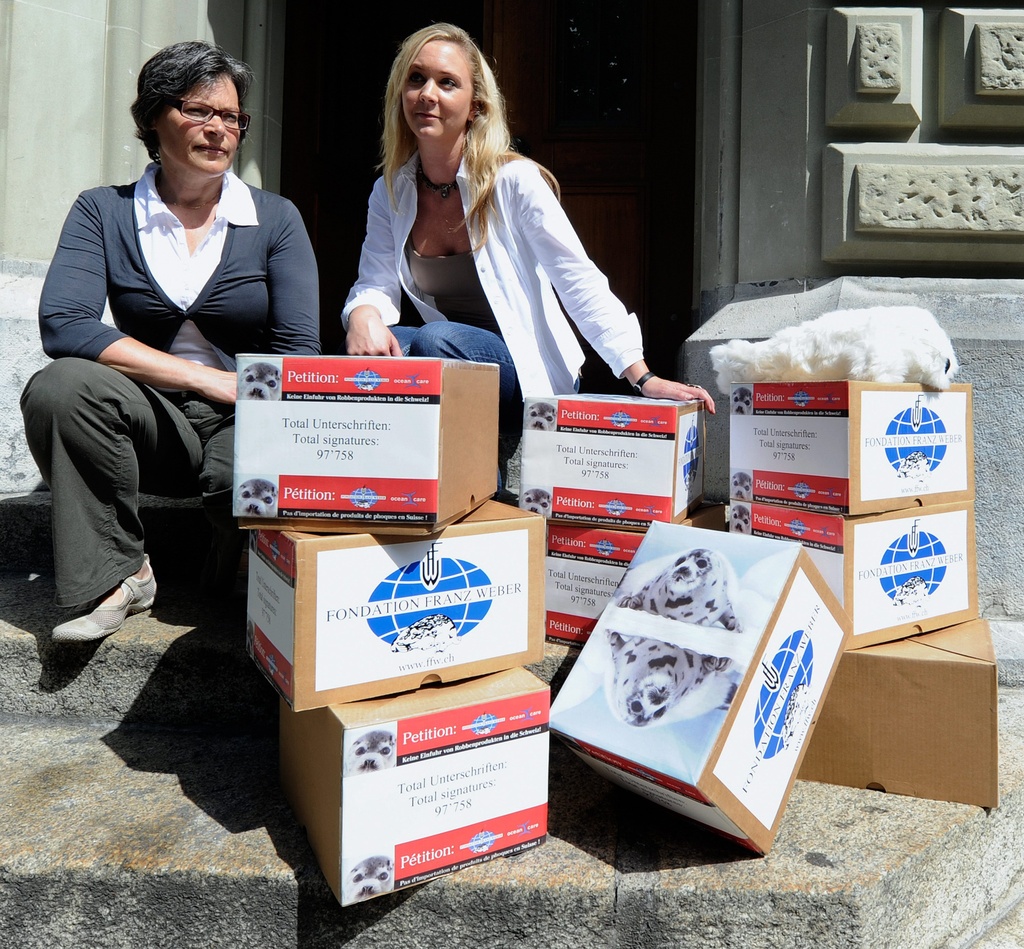
Activists step up campaign to ban seal products

Animal rights campaigners have gone on the offensive for a Swiss ban on importing seal products, releasing gory hunting footage and handing a petition to parliament.
The Swiss non-profit Franz Weber Foundation and the Ocean Care organisation collected over 97,000 signatures in a petition backing an embargo on Canadian seal products that have been hunted commercially. A similar ban was imposed by the European Union in 2010.
Before delivering the boxes of petition signatures to parliament, Vera Weber, the young face of the Franz Weber Foundation campaign, showed a five-minute video she had filmed over the Canadian Arctic coast in which seal pups were being killed illegally.
Instead of being shot in the head or hit cleanly with a hammer, as Canadian law requires, the animals were shot in other parts of the body or dragged along by hooks before finally being killed.
Hoping to add further weight to their case is a poll commissioned by the Foundation, in which 76 per cent of 1,017 Swiss respondents backed an embargo. The results were published to coincide with the action day on Tuesday.
“We want Canada to end commercial seal hunting,” Weber told swissinfo.ch. “We are not fighting against the seal hunting that the Inuit have done traditionally for centuries. We are against the commercial seal hunt in Canada. It is cruel and cannot be controlled.”
Since the start of the EU ban, the number of seals killed has dropped dramatically, as the market for products shrunk, she added.
“We think we have given parliament a sign that the issue has the potential to become a [people’s] initiative,” added Ocean Care president Sigrid Lüber. (By collecting 100,000 signatures, voters can force a national vote on amending or adding to the constitution).
“We hope that they understand that this is really an issue for the Swiss people.”
Prepared
The three-pronged approach comes days after Swiss People’s Party parliamentarian Oskar Freysinger handed in a motion to parliament calling for a ban on products made from commercially hunted seals in Canada.
It’s the second such motion to be launched in Switzerland in recent years. The first was approved by the House of Representatives last year but later rejected by the more conservative Senate. The new motion will once again need the approval of both sections to move forward.
“We want this to work. We have done our homework. We don’t want to miss anything out and for the Senate to vote no again,” said Weber.
“It is just the Senate that is not moving towards this ban. And that’s because they haven’t realised how cruel this [Canadian commercial] seal hunt is. It is not possible to control and observe it. The footage I filmed in just one afternoon shows that this hunt cannot be done humanely.”
The campaigners say it is impossible for Canada to ensure its animal protection laws are being enforced because the seal hunt area is too large. Weber is optimistic that the “very strong video evidence” of illegal hunting practices and the public support for a ban will convince parliamentarians to support a ban this time.

More
People’s initiative
A Swiss market?
As it stands, Switzerland allows imports of seal products from Canada as seal hunting there is legal but sets out specific regulations, such as bullet velocity and the size of the hammers used to crush seal skulls.
When the EU agreed last August to ban the sale of seal products that are not made by Arctic Inuits, Canada complained to the World Trade Organization. The issue has since threatened ratification of a Canadian-EU trade agreement.
If the EU ban continues among its 27 member states, Weber says Switzerland risks becoming the go-to place within Europe for seal products.
“Canada will now try and extend their market to other countries. And Switzerland is a very interesting market. There is a lot of wealth and market possibilities,” she said.
It’s not a problem yet, though, according to the Federal Veterinary Office.
“We do not have any indication that this is happening or has been happening since the ban has been in place,” Mathias Lörtscher told swissinfo.ch.
Despite the lack of a ban on seal products, there are no known seal fur imports to Switzerland. “Trade has basically stopped,” he said. The Veterinary Office does not know however if other products are brought in, such as pills with seal oil, which can be marketed as a fish oil supplement.
Lörtscher expects the motion now with parliament to generate a discussion similar to the last time around, “with the difference that now we have about 100,000 people signing a petition to have this banned, but otherwise there is no different proof of anything that could change the position”.
“Politicians will have to decide if this way of expressing public opinion is something that changes the situation,” he added.
Survey:
The survey by gfs-zurich was carried out for the Franz Weber Foundation.
It questioned 1,017 people in February 2011.
71% opposed to the sale or trade of seal products
18% mostly against
4 % mostly in favour
3% in favour
76% definitely in favour of a Swiss embargo
13% mostly in favour
8% disagree
4% undecided
Petition:
The Franz Weber Foundation and Ocean Care petition calling for an embargo of commercially hunted Canadian seal products was launched in October 2010, one month after the Senate rejected a motion calling on Switzerland to fall in line with the European Union.
As well as calling for a ban, it aims to “send a clear signal that Switzerland is against the cruelty of seal hunting”, “so that Switzerland does not become a hub of trade in seal products”.
It was signed by 97,758 people and submitted to parliament on June 21, 2011.
An estimated 900,000 seals are killed each year globally. Outside Canada, seals are also hunted in Greenland, Namibia, Norway and Russia.
The Franz Weber Foundation says around 366,000 seals were killed in Canada each year before 2009.
The start of the EU ban, approved in 2009 and enforced on August 20, 2010, significantly reduced the numbers killed, says the organisation, with 74,200 killed in 2009, 67,000 in 2010 and 38,00 in the spring of 2011.
The EU ban affects seal oil, pelts and other derivative products used in cosmetics and medicine.
Canada regulates its seal hunt, setting quotas, and monitors and studies the seal population. It also works with the Canadian Sealing Association to train sealers on new regulations. Most commercial killing is done with guns.
Traditionally the seals have been killed with a hakapik, a wooden club with a hammer head and a metal hook at the end. Canadian regulations set out how the clubs and firearms should be used.

In compliance with the JTI standards
More: SWI swissinfo.ch certified by the Journalism Trust Initiative





























You can find an overview of ongoing debates with our journalists here . Please join us!
If you want to start a conversation about a topic raised in this article or want to report factual errors, email us at english@swissinfo.ch.